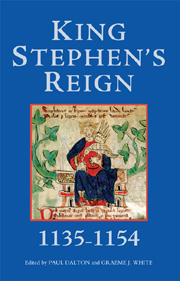Book contents
- Frontmatter
- Contents
- List of Maps
- Preface
- Abbreviations
- Genealogical Table
- Introduction
- 1 Henry I and the Origins of the Civil War
- 2 Royal Income and Regional Trends
- 3 King Stephen and Northern France
- 4 A Week in Politics: Oxford, late July 1141
- 5 Allegiance and Intelligence in King Stephen's Reign
- 6 English Monasteries and the Continent in the Reign of King Stephen
- 7 Reeds Shaken by the Wind? Bishops in Local and Regional Politics in King Stephen's Reign
- 8 Violent Disorder in King Stephen's England: A Maximum Argument
- 9 The Lure of Stephen's England: Tenserie, Flemings and a Crisis of Circumstance
- 10 Legal Treatises as Perceptions of Law in Stephen's Reign
- Index
5 - Allegiance and Intelligence in King Stephen's Reign
Published online by Cambridge University Press: 12 September 2012
- Frontmatter
- Contents
- List of Maps
- Preface
- Abbreviations
- Genealogical Table
- Introduction
- 1 Henry I and the Origins of the Civil War
- 2 Royal Income and Regional Trends
- 3 King Stephen and Northern France
- 4 A Week in Politics: Oxford, late July 1141
- 5 Allegiance and Intelligence in King Stephen's Reign
- 6 English Monasteries and the Continent in the Reign of King Stephen
- 7 Reeds Shaken by the Wind? Bishops in Local and Regional Politics in King Stephen's Reign
- 8 Violent Disorder in King Stephen's England: A Maximum Argument
- 9 The Lure of Stephen's England: Tenserie, Flemings and a Crisis of Circumstance
- 10 Legal Treatises as Perceptions of Law in Stephen's Reign
- Index
Summary
AFTER THE DEATH of Henry I, according to the author of the Gesta Stephani,
England, formerly the seat of justice, the habitation of peace, the height of piety, the mirror of religion, became thereafter a home of perversity, a haunt of strife, a training-ground of disorder, and a teacher of every kind of rebellion. The sacred obligations of hallowed friendship were at once broken among the people; the closest bonds of relationship were loosened; and those who had been clothed in the cloak of an enduring peace were assailed by the noise of war and the fury of Mars.
According to this image, intended perhaps to help justify King Stephen's accession, the troubles following Henry I's death were inextricably linked with the breaking of obligations of friendship and the loosening of bonds of relationship. In this society, as is well known, aristocrats and others were bound to each other by various obligations and relationships. These included, naming just some, those inherent in kinship, lordship, friendship, tenure, service and neighbourhood, all of which might involve expectations of allegiance. Such allegiances could be highly complex in nature and were of fundamental importance in aristocratic conduct and reputation. They could be conditional, multiple, conflicting, limited and shifting, and their complexity was always likely to increase during times of political conflict. But while allegiance is often mentioned by historians of Stephen's reign, it has been less frequently examined in depth and sometimes considerably oversimplified.
- Type
- Chapter
- Information
- King Stephen's Reign (1135–1154) , pp. 80 - 97Publisher: Boydell & BrewerPrint publication year: 2008



